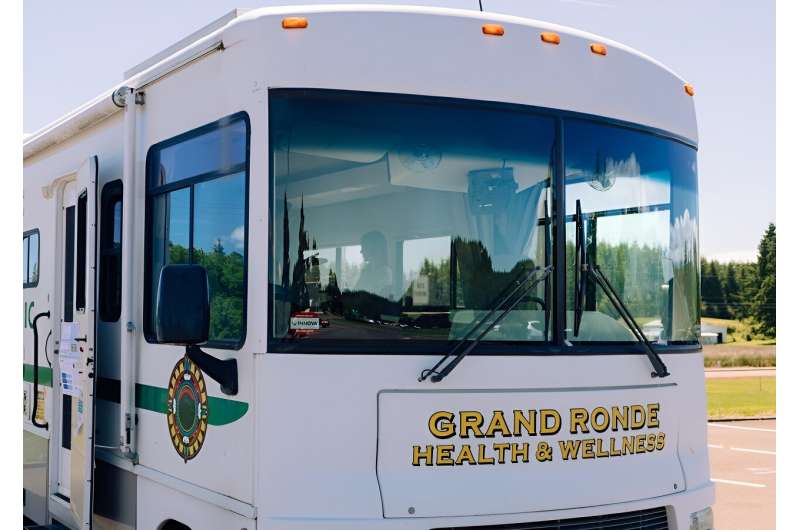This article has been reviewed according to Science X's editorial process and policies. Editors have highlighted the following attributes while ensuring the content's credibility:
fact-checked
trusted source
proofread
Tribal program takes addiction treatment on the road

With the national opioid epidemic disproportionately affecting American Indians and Alaska Natives, a tribal confederation in Oregon decided to take matters into their own hands.
The Confederated Tribes of Grand Ronde not only opened Oregon's first tribally owned opioid treatment program in Salem in 2021, but a year later, the tribe also began what is believed to be the nation's first tribally operated mobile medication unit. The mobile bus runs a daily circuit from the tribal reservation in Grand Ronde to McMinnville to Salem, seeing patients and dispensing medications directly to tribal members struggling with an opioid use disorder.
The program appears to be an early success.
Experts with the Confederated Tribes of Grand Ronde and Oregon Health & Science University describe the experience of patients and staff in a qualitative study published recently in Annals of Medicine.
"The tribe has felt the devastating impacts opioid addiction can have on individuals, families and communities," said Kelly Rowe, Health and Wellness Director for the Grand Ronde Tribe. "It's heartbreaking, and we have a responsibility to do everything possible to get individuals care and on the path to recovery."
The new study cites nationwide survey data revealing American Indians and Alaska Natives report higher rates of illicit drug use, substance use disorders and overdoses than any other demographic group nationwide. At the same time, the study notes that addiction therapies that rely on Food and Drug Administration-approved medications can conflict with traditional tribal healing practices.
Grand Ronde tribal leaders deserve credit for taking a proactive approach through their Great Circle Recovery program, said study co-author Dennis McCarty, Ph.D., professor emeritus of public health and preventive medicine in the OHSU School of Medicine and the OHSU-Portland State University School of Public Health.
"We know that tribes across the country struggle to respond to opioid use disorder," McCarty said. "Tribes often do not have methadone partly because they are located in rural areas where it's difficult to set up an opioid treatment center, and also because many tribes tend to be philosophically uncomfortable with it."
Great Circle Recovery, which provides treatment to tribal and non-tribal people alike, embraces a whole-person approach.
"Treatment can't be limited to the medications," Rowe said. "We believe that patients need to feel welcomed, cared for and a valuable part of the community. Our hope is that we can give them that by focusing on the whole person, not just the addiction."
McCarty said the Grand Ronde experience is significant because it demonstrates a model that could be useful to other tribes and for rural areas elsewhere in Oregon and across the country.
"This can be done in a culturally responsive approach," he said.
The authors wish to thank all participants, as well as the Confederated Tribes of Grand Ronde, for their participation in this study.
More information: Kim A. Hoffman et al, Engaging the Great Circle: a qualitative study of the Confederated Tribes of Grand Ronde's mobile medication unit, Annals of Medicine (2024). DOI: 10.1080/07853890.2024.2306492




















